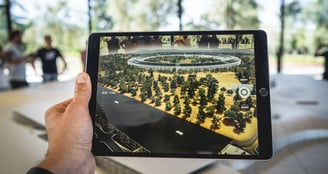Metaverse and Retail


The Metaverse is a virtual multiverse that has the potential to revolutionize the retail industry. Using 3D and augmented reality technology, it allows retailers to create immersive shopping experiences for their customers, such as virtual showrooms and stores.
Metaverse also enables retailers to offer personalized and targeted marketing campaigns to their customers, as well as track customer data and analytics in real-time. Moreover, Metaverse can facilitate faster and more efficient deliveries, as well as provide intuitive payment solutions. In short, the Metaverse is a powerful tool that can help retailers provide better service to their customers, boost sales and revenue, and stay competitive in the market.
Web 3 is essential for Metaverse as it provides the technology that allows the platform to function. Web 3 enables the platform to connect users and services, allowing them to securely share data and resources. It also provides tools for users to interact with the platform, such as wallets and smart contracts, which are necessary for the platform to be decentralized and secure.
Moreover, Web 3 technologies provide the infrastructure for users to monetize their services and generate income. Overall, Web 3 is essential for the functioning of Metaverse, allowing it to provide users with a safe and secure platform for their transactions and activities.
There are many potential use cases for Metaverse in the retail industry. For example, retailers can create virtual showrooms to showcase their products in a more immersive and engaging way.
They can also use virtual stores to offer customers a unique shopping experience. Furthermore, retailers can use the Metaverse to target customers with ads and offers, track customer data in real-time, and provide payment solutions.
Additionally, they can use the Metaverse to provide faster and more efficient deliveries.
There are several retailers who have already implemented Metaverse. Walmart, for instance, has used the platform to create virtual stores and offer customers a unique shopping experience. Target has also used Metaverse for targeted ads and offers.
Amazon has used the platform to provide faster and more efficient deliveries. BMW has also used the platform to create a virtual showroom. All these examples demonstrate the potential of Metaverse in the retail industry.
Where does NFT Fit in?
NFTs have been used by retailers in the Metaverse, and many big-name companies have adopted them in order to provide customers with a unique shopping experience. For example, Nike recently launched its own NFT marketplace, allowing customers to purchase virtual sneakers and other items. Similarly, Adidas has also created its own NFT marketplace, offering customers a wide range of virtual apparel. Other big-name retailers such as Walmart, Target, and Amazon have also used NFTs to offer customers a unique shopping experience. [1], [2], [3]
Metaverse Platforms for retailers Some of the most popular Metaverse Platforms that retailers can leverage are Decentraland, Illuvium, Sandbox, Axie Infinity, Cryptovoxels, Bloktopia, Metahero, and Ready Player One. These platforms provide retailers the ability to create virtual stores and offer customers a unique shopping experience. Additionally, these platforms can be used for targeted ads and offers, faster and more efficient deliveries, and virtual showroom experiences. All these features make Metaverse an attractive option for retailers, as it can help them reach new customers and increase their sales. [4], [5], [6]
References:
[1] Top Metaverse Platforms to Know About in 2023 - TechTarget
[2] 5 Top Metaverse Platforms to Keep An Eye On in 2022 | ICUC
[3] 10 Best Metaverse Platforms That You Can Try In 2022
[4] Non-Fungible Tokens (NFTs) and the Metaverse, Explained



